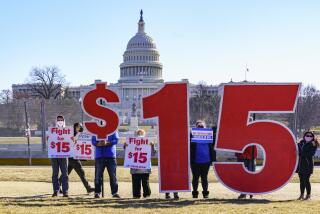The House
Minimum Wage Increase
By a vote of 382 to 37, the House sent to the Senate a bill (HR 2710) increasing the minimum wage for the first time since 1981, raising it from $3.35 an hour to $3.80 next April and $4.25 in April 1991. About 4 million workers now receive the federal minimum.
Included in the bill is a new sub-minimum wage for youths advocated by businesses but disliked by labor. The “training wage,” set at $3.35 an hour next April and $3.61 a year later, can be paid for up to 90 days to youths age 16 to 19 who are new to the work force. The bill is a compromise between President Bush and Democratic leaders, drafted after the House failed last June to override Bush’s veto of a $4.55-an-hour minimum wage.
Supporter James Traficant (D-Ohio) said the bill is needed because “it’s a sad day in America when people work eight hours a day and still qualify for food stamps and housing vouchers.”
Objecting to the new two-tier wage structure that critics say will take jobs away from adults, Carl Perkins (D-Ky.) called the bill “a sellout to the President of the United States.”
Members voting yes supported the bill.
How They Voted Yea Nay No vote Rep. Anderson (D) x Rep. Dixon (D) x Rep. Dymally (D) x Rep. Gallegly (R) x Rep. Levine (D) x Rep. Rohrabacher (R) x
Airline Takeovers
By a vote of 300 to 113, the House sent to the Senate a bill (HR 3443) enabling the Department of Transportation to prevent the sale of major airlines if the deal would result in foreign control of the carrier or enough of a debt load to jeopardize passenger safety.
Parties seeking more than 15% of an airline’s stock would have to get DOT’s prior approval. Although foreign control of major carriers is now prohibited, federal officials say the bill is needed to plug loopholes in the existing ban. The safety issue is raised by fears that leveraged buyouts will leave newly purchased airlines with insufficient cash flow to maintain their fleets.
Supporter J. J. Pickle (D-Tex.) said: “We cannot sit back while airlines, our national assets, take on billions of dollars in debt. The risks are too great.”
Opponent Dana Rohrabacher (R-Lomita) said the bill gives government too much power over the marketplace and “is more appropriate for the Soviet airline, Aeroflot, not the American airline industry.”
Members voting yes wanted the Department of Transportation to be able to block certain airline buyouts.
How They Voted Yea Nay No vote Rep. Anderson (D) x Rep. Dixon (D) x Rep. Dymally (D) x Rep. Gallegly (R) x Rep. Levine (D) x Rep. Rohrabacher (R) x
Nicaragua and the Contras
By a vote of 262 to 152, the House endorsed the harsher of two possible criticisms of Nicaraguan President Daniel Ortega for resuming combat with American-backed Contras. This meant that a measure later passed by the House (HR 221) denounced Ortega’s Sandinistas but not the Contras for violations of the Nicaraguan cease-fire. The vote swept aside a Foreign Affairs Committee measure that blamed both sides.
Robert Walker (R-Pa.) said the committee measure “is a little ambivalent about whether or not we are condemning the Sandinistas or . . . the Contras.”
Peter DeFazio (D-Ore.) said the House should denounce both the Sandinistas and “the continuing atrocities . . . of the Contras.”
Members voting yes supported a resolution criticizing the Sandinistas but not the Contras in Nicaragua.
How They Voted Yea Nay No vote Rep. Anderson (D) x Rep. Dixon (D) x Rep. Dymally (D) x Rep. Gallegly (R) x Rep. Levine (D) x Rep. Rohrabacher (R) x
More to Read
Get the L.A. Times Politics newsletter
Deeply reported insights into legislation, politics and policy from Sacramento, Washington and beyond. In your inbox three times per week.
You may occasionally receive promotional content from the Los Angeles Times.










